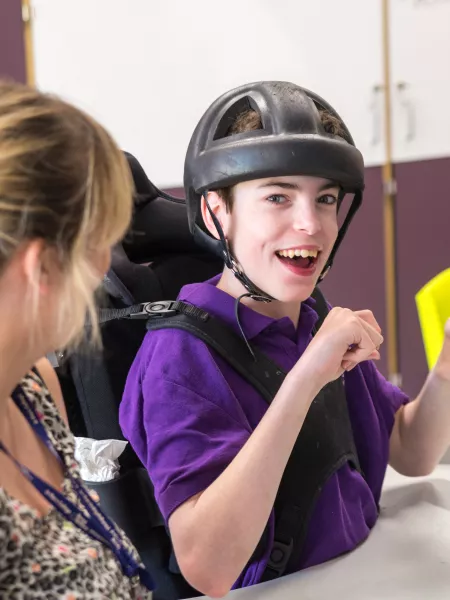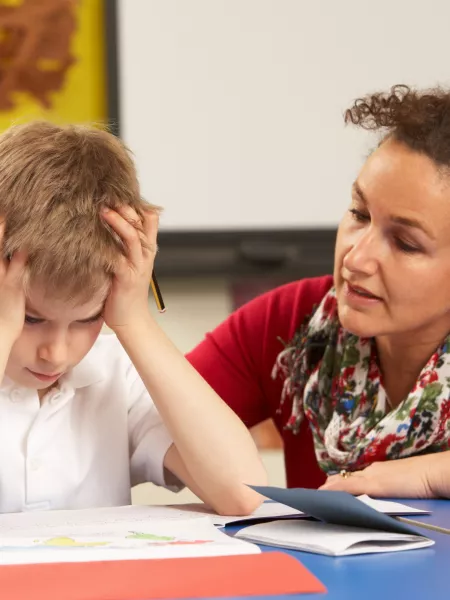Epilepsy can have a significant impact on a child’s experience of school life. Whilst at school, children may depend on staff to recognise and respond to seizures, as well as understand the wider impact that the condition can have on learning and behaviour.
Every child with epilepsy should have an Individual Healthcare Plan for school. setting out information about their condition and the support they need to be safe and included at school.
Young Epilepsy surveyed young people with epilepsy and their parents/ caregivers about the support they received at school during 2021/2022 academic year. we received over 1,000 responses from across the UK and have set out our key findings in this report
We found worrying disparities across the UK in school policies and support for young people living with epilepsy after over 1,000 families from across the country responded anonymously to our survey about the support they received at school during the 2021/22 academic year.
Key findings
Young Epilepsy surveyed young people with epilepsy and their parents’ about the support they received at school during the 2021/22 academic year. We received over 1,000 responses from across the UK and have set out our key findings below:
- 36% of children with epilepsy did not get the support they needed for full participation in school life.
- 21% of children with epilepsy were excluded from activities or opportunities at school.
- 56% of children with epilepsy had an individual healthcare plan (IHP) at school.
For those with IHPs:
- 26% had not been reviewed in the past 12 months.
- 36% included how epilepsy might affect learning.
- 29% of young people and parents had seen the school’s policy on supporting children with health conditions.
Participation in school life
Schools have a responsibility to ensure that children with epilepsy get the support they need to fully participate in school life. Each UK government has guidance on supporting children with health conditions at school.
Support arrangements for children with epilepsy are also part of schools’ safeguarding and equality responsibilities. Children with epilepsy are protected from disability discrimination and schools are required to take reasonable steps (known as ‘reasonable adjustments’) to ensure they are not placed at a disadvantage compared to other pupils.
We heard from some families about positive experiences of support at school:
“School look after me and let me rest if I am too warm or feel like I am going to have an epileptic fit.” (Young person)
“I get rest breaks at school during exams in case I feel an aura coming on and the school are really accepting that I may need time off after a seizure.” (Young person)
“Class teacher is amazing, has everything in place to support [my daughter] to make her no different to another pupil.” (Parent)
“Fully encouraging and supporting him, not just his education but with school experience.” (Parent)
However, our survey found that 36% of children with epilepsy did not get the support they needed for full participation in school life.
Several families mentioned a “battle” or “struggle” to get the right support in place, often over a long period of time.
“I’m forever having to be ‘that parent’ to email and remind them of her needs and rights. It’s extremely exhausting.” (Parent)
“It took four years for the staff to train and understand the signs of seizures.” (Parent)
Some families shared their experiences of not being believed by school staff.
“Certain members of staff had no idea how to cope with seizures, some even accused him of faking it, others thought it was disruptive and an inconvenience.” (Parent)
“Wish they'd believe us.” (Parent)
We heard about many children with epilepsy who were missing out on learning and broader school life because they were sent home unnecessarily.
“The school were happy for me to be at home. Not their problem if not on site.” (Young person)
“Sent home every time he had more than two absence seizures or complained of a headache ‘in case he had a bigger seizure’”. (Parent)
“Sent home at least once a week for no reason despite intervention by epilepsy nurse without being given work to catch up. He is now behind and his mental health is bad”. (Parent)
“Before [the epilepsy nurse went in to train the staff] I would have to collect her from school on a daily basis. I had to change my job to accommodate it.” (Parent)
Children with epilepsy do not always need to go home after a seizure. Some young people may just need some time to rest before they can re-join the school day. For example, one parent mentioned that her daughter has a bean bag at school to sleep on after a seizure.
Some families mentioned the lack of support they had received from school, despite ongoing seizures having an impact on children’s school attendance.
“We get no support and my child is admonished for failing to achieve over 90% attendance due to tiredness and seizures.” (Parent)
“Has been hospitalised and missed days due to seizure activity, the only thing we got were warning letters about attendance.” (Parent)
Exclusion from activities
Some children with epilepsy are unable to take part in certain activities due to specific medical advice. However, in most circumstances young people with epilepsy can be included, with the right support.
We heard from several families about schools enabling children’s participation in specific activities.
“The school has gone above and beyond for him to access school life as fully as possible. He has even completed bronze D of E with shooting as his skill.” (Parent)
“The school do consider her photosensitivity so school photo for my daughter is taken outside without the flash and any tv or screens they may watch they keep the main room lighting on for her.” (Parent)
However, our survey found that 21% of young people with epilepsy were excluded from activities or opportunities at school. Families told us about children with epilepsy not being able to participate in important milestones in school life, such as residential trips, sports days, leavers’ shows, prom and school photos.
“Not allowed on school trips, or to attend prom because of flashing lights.” (Young person)
“Wasn't able to go on a residential for two nights ... Only one who didn’t go”. (Parent)
“Today my daughter missed out on the year 6 end of primary school play... her teachers refused to remove the flashing lights from the play despite knowing that she has epilepsy and her triggers, so my daughter missed a day of school and stayed at home whilst all her friends in her school got to perform in the school play in front of all their parents, the last one ever for primary school. It hurts! They wouldn't remove the flashing lights! If a person is in a wheelchair, they will provide a ramp, so why can't they remove the flashing lights so that my daughter can be included and participate. Today was a very sad day, I cried a lot.” (Parent)
Areas where children with epilepsy were excluded from participating included:
- Day trips Breakfast club
- School residentials After school club
- Outdoor play Cooking lessons
- PE / sports day / sports events
- Swimming and water activities
- School show
- School prom / disco
- Bike skills
- Science experiments
- Lessons with flickering screens
- Secondary school transition events
- Work experience
- School photos
“Wasn't allowed to do any PE or the like all year even though given the okay by the doctors and medical team.” (Young person)
“I wasn’t allowed to participate in school trips due to the risk of having a seizure, even on small local trips.” (Young person)
“He wasn't allowed outside at lunchtime due to lack of staffing. This happened for eight weeks until I contacted the Department for Education then it was resolved within a day.” (Parent)
We heard from families about the emotional impact on young people from being excluded from activities.
“They think the different colours contribute to his seizures, colours do NOT at all. I've explained this to them. They still don't allow him in the coloured playgrounds. This is where children of his own age are, he is being separated from peers for no good reason. This is making him sad, depressed and lonely.” (Parent)
“She had to sit out of rowing for a whole term because the staff weren’t seizure trained and didn’t try to get trained. It had a massive knock on her confidence.” (Parent)
Although national guidance in some parts of the UK makes it clear that parents should not be expected to attend school or visits to enable their child’s participation in activities, we heard many examples of this happening.
“Several times I was told I needed to attend events if my daughter was to take part.” (Parent)
“I had to give up my time to supervise my son at swimming lessons because the school didn’t have enough staff. Otherwise he would have missed out.” (Parent)
Individual healthcare plans
Every child with epilepsy should have an individual healthcare plan (IHP) for school, setting out information about their condition and the support they need to be safe and included. IHPs should include key information such as what to do in an emergency as well as support
for the child’s educational, social and emotional needs.
An IHP is needed even if seizures are currently controlled by treatment. Seizures may reoccur and the child’s condition may still be having an impact on their learning and behaviour at school.
Our survey found that only 56% of children with epilepsy have an IHP for school. This low figure is concerning and represents a decrease in the use of IHPs for young people with epilepsy (from 63% in 2019).
“School had no care plan in place despite being informed of his condition three years ago. Support has been shocking.” (Parent)
“asked could he have an action plan... [but was] told that all the staff know he has seizures and I needed to calm down and was made to feel like I was being over the top.” (Parent)
“When she went to secondary it took for her to have attendance issues before a plan was put in place even though I'd discussed with the school she needed a plan. It was only when I threatened Ofsted in a complaint letter that a care plan was drawn up.” (Parent)
Individual healthcare plans play an important role in clarifying a young person’s needs and communicating them effectively amongst school staff.
“In general this and every school my daughter has been to do not disclose to staff that she has epilepsy. The head first aider knows but everyone else is not informed. One previous primary said can't disclose due to GDPR.” (Parent)
“It’s obvious that not all teachers read the healthcare plan. Especially if there is temporary staff I can tell that it’s not been read. This is very frustrating.” (Parent)
IHPs should be reviewed at least annually, or sooner if circumstances change. However, our survey found that where IHPs were in place for children with epilepsy, 26% had not been reviewed in the past 12 months.
“Our son’s healthcare plan was not kept up to date resulting in us making a complaint against the school.” (Parent)
Most IHPs for children with epilepsy included key medical information, such as what to do when a seizure happens (93%), what to do in an emergency (88%) and information on current medication/treatment (84%).
However, families still spoke of challenges related to schools’ understanding of medication and emergency planning.
“It was recently suggested that my child attend a day long visit without taking his emergency medication there. Headteacher told me likelihood of a seizure happening was low risk!” (Parent)
“School will not take out [emergency medication] with the teacher if out at PE. A lot of PE at my daughter's school is not conducted within confines of school. ... the facilities used are at least a five minute drive away, if traffic is clear.” (Parent)
Another parent told us that medication had been given incorrectly to their child, who did not have an IHP.
A significantly high proportion of children with epilepsy have difficulty with cognition or behaviour, although this impact often goes unrecognised. Our survey found that only 36% of IHPs for children with epilepsy included how the condition might affect their learning.
We heard some positive examples of how schools were able to support young people with how epilepsy was affecting their learning.
“individual teachers are ... aware that either the epilepsy or the medication affects his memory.” (Parent)
“Great support in GCSEs with separate room, 10 minute breaks each hour if needed to relieve stress. Exam invigilators trained in what to do if a seizure happened.” (Parent)
However, we heard from many young people and parents about the lack of support and understanding related to epilepsy’s impact on learning.
“School doesn't seem to show any concern unless you are having a seizure.” (Young person)
“I had to get the neuropsychologist in school to explain frontal lobe behaviour as my daughter was frequently in trouble for emotional outbursts.” (Parent)
“Fantastic support healthcare wise. Not enough understanding education wise. My daughter’s memory and abilities with comprehension tasks have been affected by her epilepsy...” (Parent)
“I found the school do not take into consideration the side effects of medication. My young boy has experienced a change in his behaviour and they just put it down to him being naughty. He is the sweetest caring boy who is now having some difficulties.” (Parent)
Many families spoke about less noticeable seizures (such as absence seizures) being missed by school staff. These seizures can affect a child’s consciousness, which has an impact on learning.
“My son was treated differently by the staff at school who thought his absence seizures were just him daydreaming and not paying attention. Therefore he would be sent out of class.” (Parent)
“The school knew my son as an abled child who could do the work given no problems, fast forward to [after his first seizure] his work totally declined and now he gets in trouble for not being able to do it as he has random focal seizures throughout the day. The school are no help at all.” (Parent)
“I’ve got a healthcare plan and on it, the first two lines state ‘absence seizure epilepsy and inattention’ and in a certain lesson I hadn’t done the homework because I had an ‘episode’ and hadn’t heard what to do. I had messaged the specific teacher and still didn’t understand what to do. I got a few detentions etc and eventually my mum spoke to her... the teacher said that she’s aware I have a healthcare plan but wasn’t aware I was epileptic, but that is the first thing on it!” (Young person)
Children with epilepsy are at greater risk of experiencing a mental health problem than other young people, so it is important that any social and emotional needs are also included in individual healthcare plans.
“The school have been excellent ... I can't thank them enough for their help, support and peace of mind. My daughter is also [having] mental health therapy at school for trauma.” (Parent)
“My daughter ... does feel isolated at times as she feels no one else understands how she feels.” (Parent)
“She has received no emotional support at all. She had her mock GCSEs last term and had a seizure as a result of the stress and the school only made contact with us because she didn't meet their expected targets. Not to see how she was after her seizure.” (Parent)
In addition to an IHP, children with the greatest learning difficulties may be able to access funded support plans through their local authority. Our survey found that 35% of children with epilepsy at school had a funded support plan for additional needs such as an EHCP (England), statement of SEN (Northern Ireland), CSP (Scotland) or IDP (Wales).
Many parents spoke about their children falling behind in their learning and support taking years to get in place.
“We have applied for an EHCP but have been told it will be rejected. Our son has around 50 absence and focal seizures per hour. He is behind in every area and no one seems interested in how his frequent loss of consciousness may affect his learning. We don't know what to do!” (Parent)
“My daughter is in year 6. She went six years with no help, everything blamed on epilepsy. She is now three years behind and have this year completed an EHCP assessment which states she should have had a one-to-one throughout primary and that she has complex needs We are now four weeks to the end of term with no high school place for next year due to them not listening for six years.” (Parent)
Communication
Good communication is essential for ensuring children with epilepsy get the support they need at school. This includes communication between the school, young person, parents and healthcare professionals.
We asked who had been involved in putting together the young person’s IHP for school and families told us the following:
61% School staff
63% Healthcare staff (e.g. school nurse, epilepsy specialist nurse, GP, consultant)
19% Young person
76% Parent / carer
We heard from many parents about the positive role of epilepsy specialist nurses and school nurses in getting support in place for their child.
“[The school] contacted the epilepsy nurse specialist who came into school to talk to teachers and classroom assistants about epilepsy and how to deal with and recognise seizures.” (Parent)
“I've had great support from paediatric community nurses who referred to school nurses (not based in school). Head at school was initially blasé, little reassurance and some defensiveness so it's been hard.” (Parent)
There were also some challenges identified in communication between healthcare and education professionals.
“Lots of kindness and meetings, but not a lot of action. The school seems to be waiting for medical/clinical things to happen, whereas school isn’t the priority (understandably) for medical professionals. Things are moving very slowly because of that.” (Parent)
Children and young people with epilepsy should be involved in discussions about their support needs at school. We heard from some families about young people speaking out.
“Not all teachers were aware of my epilepsy, so they didn't know how to help until I told them.” (Young person)
“My daughter polices herself and is her own advocate at school. Each term she reminds her teachers of her epilepsy and possible triggers. Haven't felt like school are as keen as they should be.” (Parent)
Some of the survey responses also highlighted where communication with children with epilepsy was lacking.
“I would have liked to be involved more.” (Young person)
“He cannot go out when it’s hot, so was kept in the classroom. He thought he had been naughty.” (Parent)
Ongoing communication between parents and school staff is central to children’s support at school. This is particularly important due to the fluctuating nature of epilepsy and how it might be affecting a young person.
“My son’s school has gone above and beyond for my son. He has a seizure care plan; we communicate daily on changes.” (Parent)
“My daughter’s class teacher completed a daily record in a home class link book. This proved very important when sharing information with the consultants to understand more about what was going on. She recorded things such as ‘fizzy eyes’, ‘feeling sick’ as well as the time and how long the feelings went on for.” (Parent)
We heard from some parents who had struggled with poor communication from their child’s school.
“l am not always informed of seizures he has had at school which is a worry.” (Parent)
“Lack of communication throughout. Emails never replied or call backs in regard to a new diagnosis for my daughter learning to cope with her condition that has just started this year. Lack of support, empathy, understanding.” (Parent)
“Transition to secondary school has not been good - I have really struggled to get hold of a member of staff (emailed three times and called three times), so he went on a full transition day with them having limited knowledge of his type of epilepsy and seizures.” (Parent)
Training
Training for school staff enables them to identify and respond to seizures and understand the impact that epilepsy has on children. We asked families whether school staff had received any of the following training and they responded as follows:
45% Seizure first aid training
29% Emergency medication training (for prolonged seizures)
12% Training on how epilepsy might affect learning
It is possible that a larger proportion of school staff have received training in these areas, as families may not always be made aware when training has taken place.
Young people and parents shared their experiences of school staff lacking training or understanding to provide support.
“Little seizure first aid / knowledge.” (Young person)
“The school doesn't know how to time the length of a seizure.” (Young person)
“Most teaching staff ... are fumbled with epilepsy or treat it like no big deal, like you just had a seizure go back to class.” (Young person)
“Staff should attend more training with regards to epilepsy.” (Parent)
Schools need to ensure that sufficient numbers of staff have been trained so that children are able to access support when they go out on visits and when staff are away.
“I missed many trips because not enough people were trained and I was constantly told I was a risk.” (Young person)
“Poor support when she was being looked after by a staff member who didn't know her well. She had two seizures and they failed to understand the plan, call me or call the onsite nursing team. ... This illustrates the importance of training not just the staff members most likely to interact with my child, but every adult working in the school.” (Parent)
Our survey identified that 39% of children with epilepsy have emergency medication at school for prolonged seizures. This medication may be stored at school or carried by the young person or school staff. Emergency medication training for school staff is an essential element of support for these children. Several families mentioned challenges in school staff getting the necessary training, including lack of funding.
“Had a phone call last week to say they were struggling to find his [emergency medication] as the first aider was away! They needed it for a school trip! (Parent)
“He couldn’t go on trips because certain people weren’t trained [in emergency medication] for my child.” (Parent)
“In the last two years, there has been a delay in the epilepsy nursing team giving the teachers training in how to administer [emergency medication] so my child has moved to a new class where [for a while] the staff haven't known how to administer [the medication]”. (Parent)
Several families mentioned the need for more training and understanding about different seizure types and how epilepsy affects young people.
“The school did not understand the anxiety and mental health effects of having epilepsy. Some school staff have been very dismissive and lack training.” (Young person)
“I think teachers need more training or information on how the side effects of medication can affect [children’s] learning.” (Parent)
“I think schools should be given more explicit advice / training on how epilepsy can affect learning and strategies / methods to use in the classroom to help students overcome these challenges and access the education just like anyone else.” (Parent)
We also heard from several families about other children at school reacting negatively to seizures and the importance of wider understanding in the school community beyond staff training.
“Schools rarely mention epilepsy so when things happen, like I have an absence [seizure], everyone stares at me weirdly and it kinda upsets me because it’s not like I can help it y’know? I wish that people were taught about it even if it was just one lesson in science one day where they are taught what it is, and how to help someone with it.” (Young person)
“When my son got a seizure after being seven years seizure free, it was spotted by another child who [notified the teacher] while other kids were laughing at my son. More kids need to understand about epilepsy!” (Parent)
“Children have triggered seizures in him with no consequence.” (Parent)
“As a parent I’ve asked school to do an assembly about epilepsy awareness, what to do to help, as it breaks my heart when my son is scared about going to school and is only 5 years old.” (Parent)
“They have also trained in a very basic way some friend buddies to help him walk around the school, ones he feels comfortable with, as he is himself very self-conscious about this new condition and doesn't like talking about it.” (Parent)
“One of the biggest things to come from this year is how the other students would like to be taught about seizures, what they look like and how to help. This is the plan for the next academic year.” (Parent)
Policy on supporting children with health conditions
Every school in the UK should have a written policy in place explaining the school’s arrangements for supporting children with long-term conditions to ensure their full participation in school life. This includes the use of individual healthcare plans, communication and staff training. Each UK nation has government guidance in this area to support schools.
Our survey found that only 29% of young people and parents had seen the school’s policy on supporting children with health conditions. This highlights a need for greater transparency and shared understanding regarding schools’ support arrangements.
“I received no support. I don't know what support I am entitled to and most of my teachers are unaware of my epilepsy.” (Young person)
“Difficult to know our rights, lack of information.” (Parent)
Best practice is for schools to publish the policy on their website, so it is easily accessible for families and staff. However, the Health Conditions in Schools Alliance found that less than half of schools* (40%) had a medical conditions policy on their website.
Recommendations
Young Epilepsy is calling for:
- Every child with epilepsy to have an individual healthcare plan (IHP) for school, setting out information about their condition and the support they need to be safe and included at school.
- Every school to put their medical conditions policy on their website, showing how they will support the full participation of children with long-term conditions.
If you are a young person with epilepsy at school (or their parent), you can:
- Ask your school for an individual healthcare plan (IHP)
- Ask the school to publish their medical conditions policy on their website
- Share our Guide for Schools with your teachers: www.youngepilepsy.org.uk/guideforschools
Survey demographics
- 1,007 responses from across the UK related to support in the 21/22 school year
- 21% of responses were from young people / 79% from parents/carers
- 48% primary / 52% secondary
- 93% state / 7% private school
- 88% mainstream / 12% special school
Responses from across the UK nations:
- 83.6% England
- 3.6% Northern Ireland
- 6.7% Scotland
- 6.1% Wales






